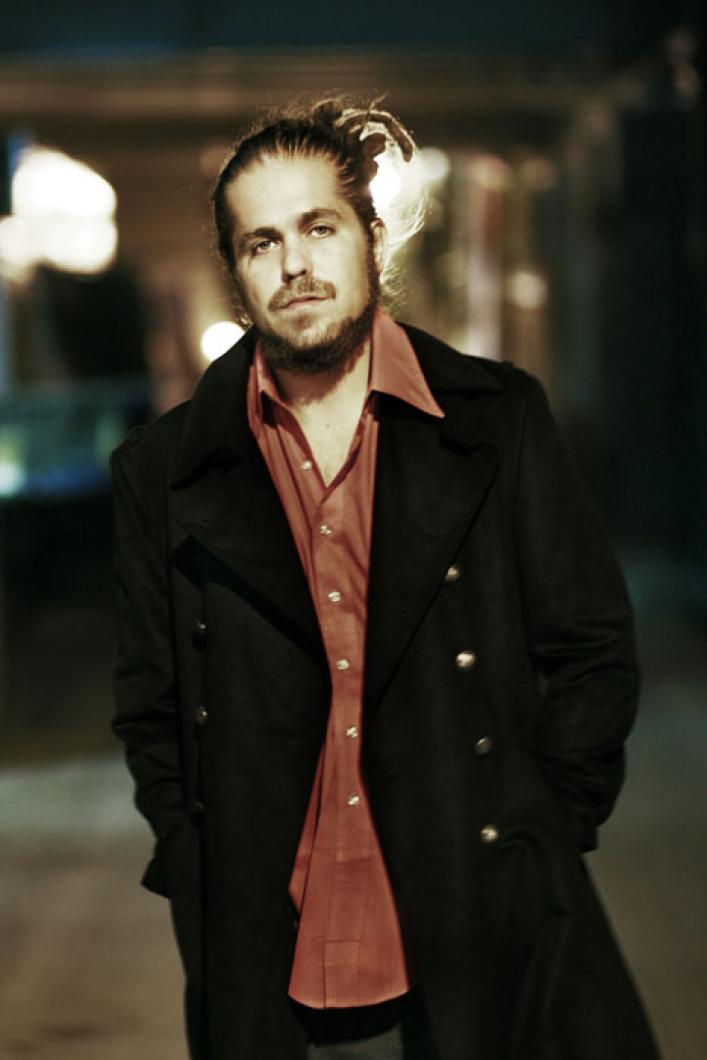With a voice that embodies a dusty road at the moment when day surrenders to evening, Citizen Cope found the intersection of sensual and earthly. The Memphis-born, D.C.-raised post modern troubadour blends reggae, jazz, folk and various strains of roots music as if there are no lines dividing music — and it shows on his dusky The RainWater LP on his own RainWater Records.
Given his influences’ breadth — the man born Clarence Greenwood grew up on a diet of Al Green, Willie Nelson, Stevie Wonder, Sly Stone and Randy Newman — there’s a texture to his urban collages that makes his music instantly welcoming and easily absorbed. The polyrhythmic reality and deep pockets — even on a hushed song like the deeply personal Healing Hands, evoking Gil Scott-Heron at his most intimate — suggest Washington, D.C.’s go-go music scene’s lasting impact.
Defying conventions may be the most consistent aspect of Mr. Cope’s career. After signing with Capitol Records on the strength of his DIY tape, he made the unreleased Shotgun, then moved to powerhouse label DreamWorks. They released Citizen Cope — allowing the guitarist/keyboardist/deejay/producer/vocalist to tour with Nelly Furtado — in 2002.
As with all true artists, the merge with the marketplace was difficult. Mr. Cope, unhappy with how his debut release was handled, took an advance from Arista Records, buying himself out of DreamWorks. Then he took his collective creativity and channeled it for The Clarence Greenwood Album, ultimately selling over 300,000 copies in excess of 700,000 downloads.
Part of The Clarence Greenwood Album’s success stemmed from the placement of Son’s Gonna Rise in a national Pontaic ad campaign. Though a nontraditional channel for exposure, that and Citizen Cope’s Let the Drummer Kick, which anchored a 2008 Acura commercial, proved Madison Avenue understood what major labels didn’t seem to.
Through it, Mr. Cope kept on the road. Touring everywhere and anywhere, he played where he could find gigs, not just the major urban markets, but Fayetteville, Ark., Tulsa, Okla. and Oxford, Miss., found their way onto his itinerary, and in the process, an audience was galvanized.
Hand over hand, fan by fan, Mr. Cope was realizing he was the master of his fate as a recording artist. Though he released Every Waking Moment in 2006 on RCA Records, his fourth label over three albums, it was only a matter of time until the socially conscious songwriter/soul troubadour was going his own way.
In 2010, he put out The Rainwater LP the way he wanted. Critical response was immediate and positive. The Wall Street Journal raved, “[Citizen Cope’s] music has a complexity that emerges from his sense of rhythm and gift for wordplay . . . the lyrics are by turns novelistic, poetic, political, violent and tender,” while the nation’s leading wire service, the Associated Press, offered there “are many gems on (The Rainwater LP).”
Laconic, weightless, layered without sacrificing the spaciousness between instruments, Mr. Cope found a way to express his truth that gave it room to breathe. In a world where nuance seems to be the enemy, he coaxed subtlety from a very vital collection of songs.
He had help. His studio players were the best imaginable, and not from the traditional well of musicians who support singer/songwriters. Rather Mr. Cope enlisted many of modern soul’s finest: a rhythm section of bassist Preston Krump (OutKast, Raphael Saadiq), keyboardist James Poyser (the Roots, Jill Scott, D’Angelo, John Legend), percussionist Bashiri Johnson (Donald Fagen, Madonna), as well as go-go legends Michael (Funky Ned) Neal and Paul (Buggy) Edwards on bass and drums.
And songs that work a strong emotional and lyrical plane don’t have to be devoid of rhythmic intrigue or layered arrangements. Indeed, for Mr. Cope, especially on his latest, the intellectual aspect serves as an invitation to explore what’s possible in these three to four-and-a-half-minute parcels of life, soul and falter.
And if his genre-blurring musical hybrid vexes critics and marketers, it’s allowed Mr. Cope to live beyond the record business for well over a decade. Whether the machined electronica and percussion that serves to elevate Jericho with its chant vocals or the serpentine electric guitar slithering through pillows of keyboards on A Father’s Son, Mr. Cope straddles varying feels with an ease that unites disparate elements.
Even the haunted Lifeline, hollow vocal over a few piano chords and strummed acoustic guitar, his confession that “If you come looking for hard times, hard times ain’t hard to find . . .” becomes an essential reality that also balms whatever difficulty one is facing.
That community and recognition has forged an audience for the man who’s believed in the truth of his music and continued on , no matter what. To that end, it should be noted Lifeline has a chorus that culminates in the stop-start revelation, “We were born, maybe we were born . . . to be sure, to rejoice when it succumbs . . ..”
Citizen Cope plays Sunday, August 7, at Nectar’s. Doors open at 9 p.m.







Comments (1)
Comments
Comment policy »